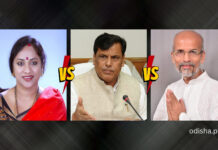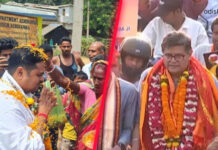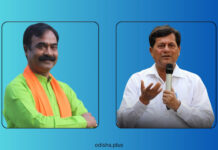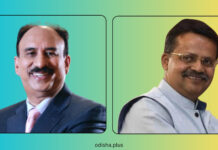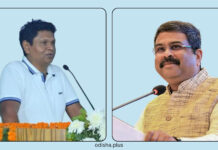Bhaskar Parichha
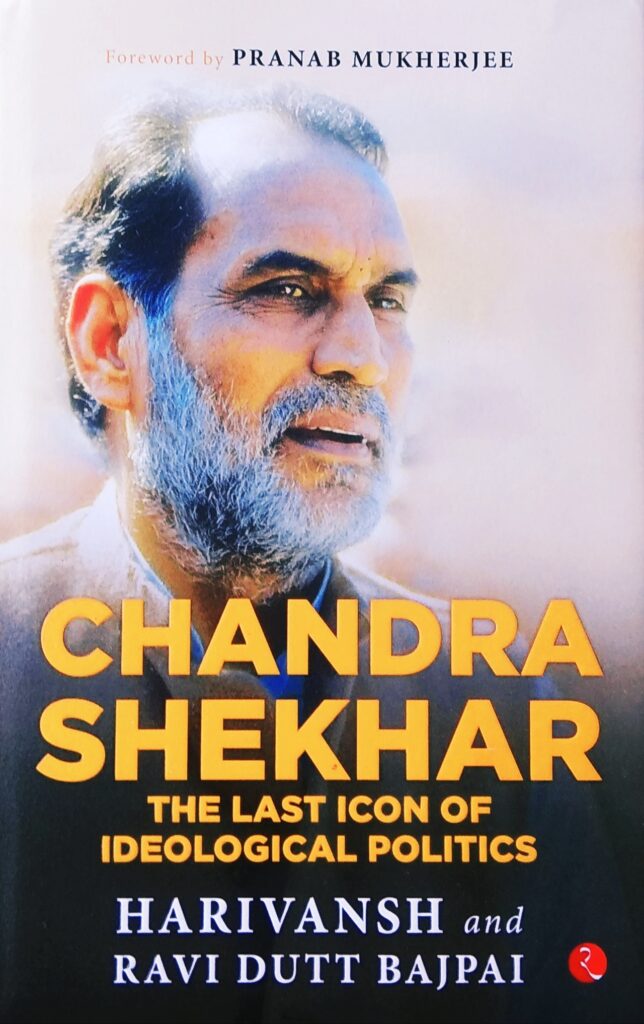 There couldn’t have been better timing than this to bring out a biography on Chandra Shekhar who was the tallest leader of his time and who closely witnessed India’s journey as an independent nation and one who shaped its political landscape. The Congress party which he battled out in the late sixties is a decimated lot and the political ideologies he cultivated too have been crying off lately.
There couldn’t have been better timing than this to bring out a biography on Chandra Shekhar who was the tallest leader of his time and who closely witnessed India’s journey as an independent nation and one who shaped its political landscape. The Congress party which he battled out in the late sixties is a decimated lot and the political ideologies he cultivated too have been crying off lately.
‘Chandra Shekhar: The Last Icon of Ideological Politics’ is a befitting compliment to a man who did not inherit an imposing legacy from a well-established and prominent family. Neither did he rely on family riches and reputation. Chandrasekhar did not attend any of the exalted educational institutions in the country or abroad. He never commanded a dedicated vote bank of any specific class, caste or community. He was a liberated politician. Despite all the zilch, Chandra Shekhar took on the most powerful prime minister of his time and became a formidable opponent of her politics and policies.
From a humble background to becoming the Prime Minister at the most difficult of times, Chandra Shekhar’s political voyage has been one of inflexible challenge. He came from a lower-middle-class family yet became the enfant terrible of India’s family politics. If he was the bête noiré of Indira Gandhi, there was a reason for it. One who was on the wrong side of the Congress politics and was never a favorite of Indira Gandhi could get himself nominated to the Congress Working Committee thrice in succession – that was his strength and potency.
All this and more is what this biography says about the Ibrahimpatty-born leader with splendid details. As the blurb says, ‘this is an up-close and extraordinary life story of an ordinary person who rose to become one of the tallest figures in Indian politics.’ Co-authored by Harivansh – seasoned journalist who had worked with the premier Hindi magazine Dharmayug and the Hindi weekly Ravivar besides editor of Prabhat Khabar and currently the Deputy Chairman of the Rajya Sabha – and Ravi Dutt Bajpai whose writing are popular in Hindi and English media and who is Doctoral research scholar on civilization exchanges between China and India at Deakin University, Melbourne, the biography is a chronicle of the times gone by.
What lends credence to the book is that Harivansh had worked in Chandra Shekhar’s PMO as additional information advisor. The erudition of the author duo and the countless factoids culled out from several sources makes this three-hundred plus paged book a fascinating read. The book has a number of photographs of the leader.
As former President Pranab Mukherjee says in the Foreword, ‘an unquestionable idealist, leader with his fingers on the pulse of the people, he believed that the ultimate answers lay with the people themselves. His commitment to the disposed and his frequent padayatras aimed at establishing a direct dialogue with the people remained a matter of faith for him throughout. He comprehended the sociopolitical landscape of the country like few others.’
Known for his courage and bold decisions he took, Chandra Shekhar was the 9th prime minister of India. Born on July 1, 1927 in a farmer family in Uttar Pradesh, he began his political career during his college days and was known as a firebrand idealist. In the seven chapters that go to present a wholesome portrait of a leader, the authors have tried to portray Chandrasekhar as a die-hard socialist and one who never tried the middle ground when it came to ideology.
Although several books have been written on Chandra Shekhar, they were mostly in Hindi. To that extent, this book fulfills the need for a biography in English. Chandra Shekhar constantly stood for principles. His earnestness and decent mannerisms in parliamentary politics find unrelenting mention in the book.
As Harivansh says in the preface, ‘the elite sections of Indian society have a tendency to undermine people from Hindi-speaking regions, and this patent arrogance of the privileged class has denied the likes of Acharya Narendra Dev, Madan Mohan Malaviya or Sampurnannad their due stature and place in history.’ The authors lament is further exemplified when he says, ‘these stalwarts of the freedom movement have been portrayed as right-wing reactionaries as if only an exclusive class of people could practice ideas of liberalism, secularism and universalism.’
Chandra Shekhar was a down-to-earth leader and he had a deep understanding of the Indian society and its deep layers. If he was a ’Young Turk’, rebellion was his trademark. A big opponent of the upper crust of the society and one who went against the shenanigans of the capitalist class, Chandrasekhar was a derelict and the English media had knowingly kept itself off from this crowd-puller.
From bank nationalization to the abolition of privy purses; from placing insurance companies in the public sector to countering accumulation of capital, he led an ideological struggle. Even his last days saw himself in the thick of antagonism towards liberalization, privatization and globalization.
Two chapters in the book ‘Salvaging the Rebellion: From Janata party to Janata Dal and ‘The Rebel Arrives: Prime Minister Chandra Shekhar’ make for interesting reading. This was the time of non-Congress politics and the rise and fall of Janata politics. The authors have tried to put those goings-on in an objective manner without being adherents of any political order.
The quintessence of the book is here:“In his long parliamentary career and short stint as prime minister, Chandra Shekhar had seen it all: exemplary achievements of the leadership and the people, political intrigues and dark days and an India that had come out of its shadows to take up a responsible position in the society of nations. Chandra Shekhar’s love for the country saw him embrace changes with equanimity and fortitude as he kept pushing leaders, including his powerful opponents, towards greater accountability and transformative politics.”
‘Chandra Shekhar: The Last Icon of Ideological Politics’ is an amazing tribute to a self-less politician and will be of much interest to those who take interest in India’s tumultuous politics. His venerable contribution to Indian politics will from now on draw closer examination all the way through this book.
‘Chandra Shekhar: The Last Icon of Ideological Politics’
Harivansh & Ravi Dutt Bajpai
Rupa Publications
7/16, Ansari Road,Daryaganj
New Delhi 110002

